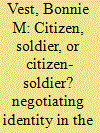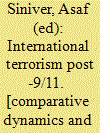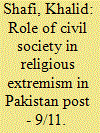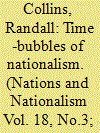| Srl | Item |
| 1 |
ID:
124060


|
|
|
|
|
| Publication |
2013.
|
| Summary/Abstract |
This study examines the construction of US Army National Guard members' dual identities as soldiers and civilians and posits processes, including behavioral practice, spatial displacement, and narrativity, which soldiers use to reconcile these potentially contradictory identities to develop an understanding of themselves as "citizen-soldiers." Ethnographic evidence gathered from in-depth interviews suggests that for National Guard members who have never experienced deployment, the two identities of civilian and soldier are mostly separated. However, after experiencing deployment and reintegration, soldier and civilian identities become more intertwined and individuals must reorganize their identity according to different conceptions; integrating on a more permanent basis two different cultural modes of being. In light of the National Guard's increased participation in deployments post-9/11, this reorganization of identity is contributing to a shift in the meaning of "citizen-soldiery" in the current US context.
|
|
|
|
|
|
|
|
|
|
|
|
|
|
|
|
| 2 |
ID:
097390


|
|
|
|
|
| Publication |
Oxon, Routledge, 2010.
|
| Description |
xv, 240p.
|
| Standard Number |
9780415552301, hbk
|
|
|
|
|
|
|
|
|
|
|
|
Copies: C:2/I:0,R:0,Q:0
Circulation
| Accession# | Call# | Current Location | Status | Policy | Location |
| 055041 | 363.3251561/SIN 055041 | Main | On Shelf | General | |
| 056707 | 363.3251561/SIN 056707 | Main | On Shelf | General | |
|
|
|
|
| 3 |
ID:
167975


|
|
|
| 4 |
ID:
114092


|
|
|
|
|
| Publication |
2012.
|
| Summary/Abstract |
The growth of modern nationalism can be attributed to structural causes, especially the growth of the strong bureaucratic state that penetrates society, creating cultural uniformity and national identity. But structurally based nationalism need not be very intense, or constant; even when institutionalised in periodic formal rituals, it can be routine, low in emotion - even boring. We need to explain sudden upsurges in popular nationalism, but also their persistence and fading in medium-length periods of time. Nationalist surges are connected with geopolitical rises and falls in the power-prestige of states: strong and expanding states absorb smaller particularistic identities into a prestigious whole; weaker and defeated states suffer delegitimation of the dominant nationality and fragment in sudden upsurges of localising nationalities. Passing from macro-patterns to micro-sociological mechanisms, conflict producing solidarity is a key mechanism: dramatic events focus widespread attention and assemble crowds into spontaneous 'natural rituals' - mass-participation interaction rituals, as distinct from formal rituals. Evidence from public assemblies and the display of national symbols following the terrorist attacks of 11 September 2001 (9/11) shows an intense period of three months, then gradual return to normal internal divisions by around six months. Spontaneous rituals of national solidarity are produced not only by external conflict but by internal uprisings, where an emotional upsurge of national identity is used to legitimate insurgent crowds and discredit regimes. Although participants experience momentary feelings of historic shifts, conflict-mobilised national solidarity lives in a 3-6-month time-bubble, and needs to institutionalise its successes rapidly to have long-term effects.
|
|
|
|
|
|
|
|
|
|
|
|
|
|
|
|